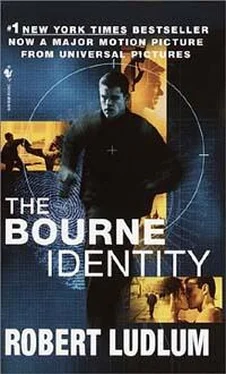“Allô?” There was silence as the intruder listened, head down, concentration on the caller. He was a tanned, muscular man of indeterminate age, the sun-drenched skin disguising the years. His face was taut, his lips thin, his close-cropped hair thick, dark brown, and disciplined. The sinews of his bare arms moved under the flesh as he transferred the phone from one hand to the other, speaking harshly. “Pas ici. Sais pas. Téléphonez plus tard …” He hung up and looked at Jason. “Où est Jacqueline?”
“A little slower, please,” said Bourne, lying in English. “My French is limited.”
“Sorry,” replied the bronzed man. “I was looking for Madame Lavier.”
“The owner?”
“The title will suffice. Where is she?”
“Depleting my funds.” Jason smiled, raising his glass to his lips.
“Oh? And who are you, monsieur?”
“Who are you?”
The man studied Bourne. “René Bergeron.”
“Oh, Lord!” exclaimed Jason. “She’s looking for you. You’re very good, Mr. Bergeron. She said I was to look upon your designs as the work of an emerging master.” Bourne smiled again. “You’re the reason I may have to wire the Bahamas for a great deal of money.”
“You’re most kind, monsieur. And I apologize for barging in.”
“Better that you answered that phone than me. Berlitz considers me a failure.”
“Buyers, suppliers, all screaming idiots. To whom, monsieur, do I have the honor of speaking?”
“Briggs,” said Jason, having no idea where the name came from, astonished that it came so quickly, so naturally. “Charles Briggs.”
“A pleasure to know you.” Bergeron extended his hand; the grip was firm. “You say Jacqueline was looking for me?”
“On my behalf, I’m afraid.”
“I shall find her.” The designer left quickly.
Bourne stepped to the desk, his eyes on the door, his hand on the telephone. He moved it to the side, exposing the index card. There were two telephone numbers, the first recognizable as a Zurich exchange, the second obviously Paris.
Instinct. He had been right, a strip of transparent tape the only sign he had needed. He stared at the numbers, memorizing them, then moved the telephone back in place and stepped away.
He had barely managed to clear the desk when Madame Lavier swept back into the room, a half dozen dresses over her arm. “I met René on the steps. He approves of my selections most enthusiastically. He also tells me your name is Briggs, monsieur.”
“I would have told you myself,” said Bourne, smiling back, countering the pout in Lavier’s voice.
“But I don’t think you asked.”
“‘Spoors in the forest,’ monsieur. Here, I bring you a feast!” She separated the dresses, placing them carefully over several chairs. “I truly believe these are among the finest creations René has brought us.”
“Brought you? He doesn’t work here then?”
“A figure of speech; his studio’s at the end of the corridor, but it is a holy sacristy. Even I tremble when I enter.”
“They’re magnificent,” continued Bourne, going from one to another. ‘But I don’t want to overwhelm her, just pacify her,” he added, pointing out three garments. “I’ll take these.”
“A fine selection, Monsieur Briggs!”
“Box them with the others, if you will.”
“Of course. She is, indeed, a fortunate lady.”
“A good companion, but a child. A spoiled child, I’m afraid. However, I’ve been away a lot and haven’t paid much attention to her, so I guess I should make peace. It’s one reason I sent her to Cap-Ferrat.” He smiled, taking out his Louis Vuitton billfold. “La facture, si’il vous plaît?”
“I’ll have one of the girls expedite everything.” Madame Lavier pressed a button on the intercom next to the telephone. Jason watched closely, prepared to comment on the call Bergeron had answered in the event the woman’s eyes settled on a slightly out-of-place phone. “Faites venir Janine—avec les robes. La facture aussi.” She stood up. “Another brandy, Monsieur Briggs?”
“Merci bien.” Bourne extended his glass; she took it and walked to the bar. Jason knew the time had not yet arrived for what he had in mind; it would come soon—as soon as he parted with money—but not now. He could, however, continue building a foundation with the managing partner of Les Classiques. “That fellow Bergeron,” he said. “You say he’s under exclusive contract to you?”
Madame Lavier turned, the glass in her hand. “Oh, yes. We are a closely knit family here.” Bourne accepted the brandy, nodded his thanks, and sat down in an armchair in front of the desk. “That’s a constructive arrangement,” he said pointlessly.
The tall, gaunt clerk he had first spoken with came into the office, a salesbook in her hand.
Instructions were given rapidly, figures entered, the garments gathered and separated as the salesbook exchanged hands. Lavier held it out for Jason’s perusal. “Voici la facture, monsieur,” she said.
Bourne shook his head, dismissing inspection. “Combien?” he asked.
“Vingt mille soixante francs, monsieur,” answered the Les Classiques partner, watching his reaction with the expression of a very large, wary bird.
There was none. Jason merely removed five five-thousand-franc notes and handed them to her.
She nodded and gave them in turn to the slender salesclerk, who walked cadaverously out of the office with the dresses.
“Everything will be packaged and brought up here with your change.” Lavier went to her desk and sat down. “You’re on your way to Ferrat, then. It should be lovely.” He had paid; the time had come. “A last night in Paris before I go back to kindergarten,” said Jason, raising his glass in a toast of self-mockery.
“Yes, you mentioned that your friend is quite young.”
“A child is what I said, and that’s what she is. She’s a good companion, but I think I prefer the company of more mature women.”
“You must be very fond of her,” contested Lavier, touching her perfectly coiffed hair, the flattery accepted. “You buy her such lovely—and, frankly—very expensive things.”
“A minor price considering what she might try to opt for.”
“Really.”
“She’s my wife, my third to be exact, and there are appearances to be kept up in the Bahamas.
But all that’s neither here nor there; my life’s quite in order.”
“I’m sure it is, monsieur.”
“Speaking of the Bahamas, a thought occurred to me a few minutes ago. It’s why I asked you about Bergeron.”
“What is that?”
“You may think I’m impetuous; I assure you I’m not. But when something strikes me, I like to explore it. Since Bergeron’s yours exclusively, have you ever given any thought to opening a branch in the islands?”
“The Bahamas?”
“And points south. Into the Caribbean, perhaps.”
“Monsieur, Saint-Honoré by itself is often more than we can handle. Untended farmland generally goes fallow, as they say.”
“It wouldn’t have to be tended; not in the way that you think. A concession here, one there, the designs exclusive, local ownership on a percentage-franchise basis. Just a boutique or two, spreading, of course, cautiously.”
“That takes considerable capital, Monsieur Briggs.”
“Key prices, initially. What you might call entrance fees. They’re high but not prohibitive, in the finer hotels and clubs it usually depends on how well you know the managements.”
“And you know them?”
“Extremely well. As I say, I’m just exploring, but I think the idea has merit. Your labels would have a certain distinction—Les Classiques, Paris, Grand Bahama … Caneel Bay, Perhaps.” Bourne swallowed the rest of his brandy. “But you probably think I’m crazy. Consider it just talk… Although I’ve made a dollar or two on risks that simply struck me on the spur of the moment.”
Читать дальше












